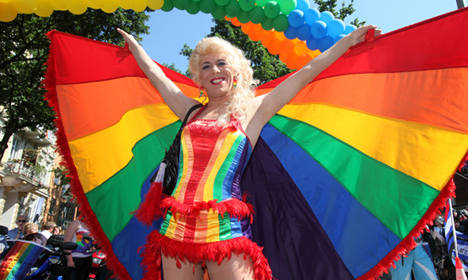A little history
First a primer on what this is all about. Germany’s gay pride celebrations are typically held around Christopher Street Day – named after New York City’s Christopher Street, home of the Stonewall Inn, where gay rights riots took place in 1969. The celebrations usually take place in late June, around the anniversary of the demonstrations.
But although Berlin has long had its own Christopher Street Day parade (usually just shortened to CSD) the city's vibrant gay scene demanded more, thus the creation of Stadtfest 19 years ago, a huge street festival which regularly attracts 400,000 visitors or more.
Germany is, of course, renowned for its tolerant atmosphere toward gays and lesbians, and in the 1920s and ‘30s Berlin was arguably Europe’s centre for gay life.
Stadtfest
Berlin’s annual street festival takes place around Nollendorfplatz, long a centre of the city’s gay community in the Schöneberg district, on June 18 and 19. With the theme “Equal Rights for the Unequal” this year, the celebration includes informational stands on sports, AIDS, politics and travel, among other topics.
There are five venues where visitors can hear music, dance and be seen and there’s the so-called “Wild Sofa” at the corner of Eisenacher Strasse and Fuggerstrasse where interviewers put tough questions to politicians and other prominent German figures.
Click here for Stadtfest's official website
Christopher Street Day
Only Cologne’s CSD rivals Berlin's gay pride parade, where 500,000 people turn up to celebrate in a massive party winding through city streets on June 25.
The procession begins at the historic Kurfürstendamm boulevard and ends at Brandenburg Gate where there’s partying, speeches and music. The Civil Courage Awards are given out there for human rights activism (incidentally one recipient last year rejected the prize after accusing CSD of being overly commercialized). This year’s honourees – two organizations as well as gay rights advocate Tanja Walther-Ahrens – have been fighting for equality in athletics.
Click here for CSD's official website
Pride week
Technically, the Pride Festival – a four-week-long cultural programme in the run up to CSD – has been going on since late May. But Pride Week sandwiched between Stadtfest and CSD, is the climax.
All through the week, Die Kurbel theatre (Giesebrechtstr. 4, die-kurbel.com) is screening gay-themed films.
There’s also the massive CSD opening party on June 24 at Tresor Club (Köpenicker Straße 70, tresorberlin.com), which attracts a mixed crowd from around the world.
Find out more on the CSD website.
Other highlights
If you’re into clubbing, Berlin offers what’s arguably the most diverse scene in the world. SchwuZ (Mehringdamm 61, schwuz.de) is good for the younger crowd, while the famous Berghain (Rüdersdorfer Straße 70, berghain.de) is mixed and somewhat hedonistic – there’s a separate sex club called Lab.Oratory (lab-oratory.de) accessible through a side entrance. For fetish-lovers, the area around Nollendorfplatz offers a wealth of interesting bars and clubs.
Stop by the monument outside the Nollendorfplatz subway to the gays and lesbians killed by Hitler during the Third Reich. There’s another monument in Tiergarten area (homo-denkmal.de). The city’s Gay Museum at SchwuZ (Mehringdamm 61, schwulesmuseum.de) is also worth a visit.
If you’re looking to get plugged into the gay scene longer-term in Berlin, you should stop by the Mann-O-Meter resource centre (Bülowstr. 106, mann-o-meter.de). Mann-O-Meter also sells the Berlin Pride Card, which offers discounts at merchants and other benefits during Pride Week.
The Sonntags Club cafe (Greifenhagener Straße 28, sonntags-club.de) in Prenzlauer Berg has meet-ups for every type of person. Lambda Berlin-Brandenburg (Manteuffelstraße 19, lambda-bb.de) is a good spot for young people wanting to socialize.
Many recent arrivals find the weekly 10 pm Thursday meet-ups for gay expats at the Perle Bar to be fun times to socialize as well (Sredzkistrasse 64, Queer Beer Thursday Facebook group or Queer Beer Thursday on Toytown).
Moises Mendoza



 Please whitelist us to continue reading.
Please whitelist us to continue reading.